PCAR and the Pennsylvania network of rape crisis centers advocate for changes in federal and state legislation to further our mission to end sexual violence and advocate for the rights and needs of sexual assault victims. Legislation is most effective when it is responsive to the realities of local communities and victims. The resources on these pages are intended to support rape crisis center staff and other partners in their policy advocacy efforts.
For training and technical assistance on policy advocacy, please contact Gabriella Romeo, Policy Director: gromeo@pcar-respecttogether.org.
 Lobbying, Advocacy, and Education
Lobbying, Advocacy, and Education
This resource provides an overview of allowable lobbying, advocacy, and educational activities when using public vs. private funds. The document is intended to clarify allowable activities for PA rape crisis center staff, drawing from laws and regulations that pertain to the political activities of nonprofit organizations. PCAR is grateful to its public policy committee for their review and partnership in developing this document.
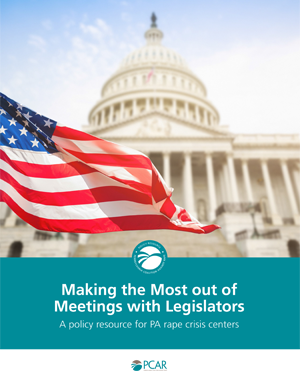 Making the Most out of Meetings with Legislators
Making the Most out of Meetings with Legislators
Local experiences and needs are the most important factors to consider in policymaking. This resource is intended to support PA rape crisis center staff in using their voices to affect policy change. More specifically, this resource provides tips and information for advocates to consider before, during, and after meetings with their representatives, senators, and legislative staff. We are grateful to the PCAR public policy committee and partners in the PA General Assembly for their time and insight in reviewing this content.
 How a Bill Becomes a Law in Pennsylvania
How a Bill Becomes a Law in Pennsylvania
This resource describes the general path that legislation takes in going from a bill to a law in Pennsylvania, including the ways PCAR and the network of rape crisis centers engage in that process. The primary audience is the PA network of rape crisis centers.
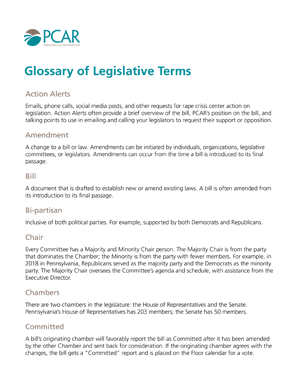 Glossary of Legislative Terms
Glossary of Legislative Terms
This resource includes a glossary of legislative terms that appear in the guide, “Making the most out of your meetings with legislators.”
State Sexual Assault Law Factsheets
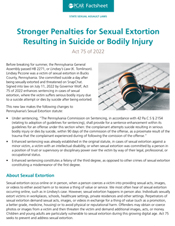 Lindsey's Law
Lindsey's Law
In the summer of 2022, the Pennsylvania General Assembly passed HB 2271, or Lindsey’s Law, which enhances sentencing in cases of sexual extortion where the victim suffers serious bodily injury due to a suicide attempt or dies by suicide after being extorted.
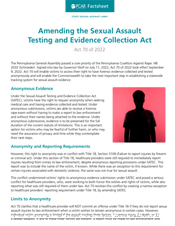 Amendment to the Sexual Assault Testing and Evidence Collection Act
Amendment to the Sexual Assault Testing and Evidence Collection Act
Signed into law by Governor Wolf on July 11, 2022, Act 70 of 2022 took effect September 9, 2022 and will enable victims to access their right to have forensic evidence collected and tested anonymously and will enable the Commonwealth to take the next important step in establishing a statewide tracking system for sexual assault evidence.
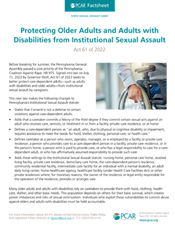 Institutional Sexual Assault
Institutional Sexual Assault
Signed into law on July 11, 2022 by Governor Wolf, Act 61 of 2022 seeks to better protect care-dependent adults—such as adults with disabilities and older adults—from institutional sexual assault by caregivers.
 Sexual Extortion
Sexual Extortion
Sexual extortion is a sex crime in Pennsylvania, with the passage of House Bill 1402 in the 2019 legislative session of the Pennsylvania General Assembly. Now law, Act 100 of 2019 establishes a clearer path for victims to seek justice and enables Pennsylvania to better identify, report, charge, and prosecute crimes of sexual extortion.
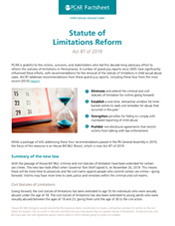 Statute of Limitations Reform
Statute of Limitations Reform
With the passage of House Bill 962, criminal and civil statutes of limitation have been extended for certain sex crimes. The new law took effect when Governor Tom Wolf signed it, on November 26, 2019. This means there will be more time to prosecute and file civil claims against people who commit certain sex crimes—going forward.
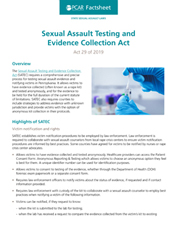 Sexual Assault Testing and Evidence Collection Act
Sexual Assault Testing and Evidence Collection Act
The Sexual Assault Testing and Evidence Collection Act (SATEC) requires a comprehensive and precise process for testing sexual assault evidence and notifying victims in Pennsylvania.





